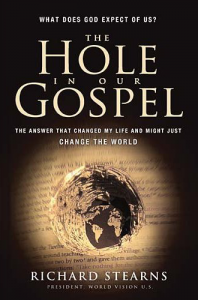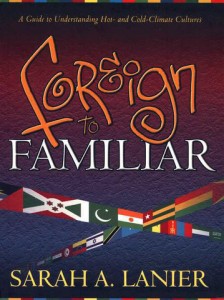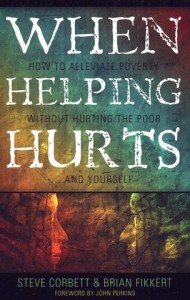It’s critical to know history, as well as continue to listen to ongoing stories and new friends we meet along the way. Critical to seeking sustainable, community transformation is also good theology and mission practice. We shouldn’t assume we have all the answers. As we certainly offer our part in working together to end the cycle of extreme poverty in the Equateur province, we’ve been reflecting on a few key books by fellow Westerners who have journeyed along this route for some time, and have some wisdom to share.
 The Hole in the Gospel (2010) by Richard Stearns, president of World Vision US, is one of the most clear, recent calls to love God and love (global) neighbors in bold, Biblical ways. Stearns vulnerably shares his family’s story, where he had once pursued a career climbing the corporate ladder, living in response to only half of the Gospel, and ultimately, hearing a call to something greater that each of us are invited to participate in: a faith in God that mobilizes believers into a world-changing revolution of love to end extreme, senseless poverty.
The Hole in the Gospel (2010) by Richard Stearns, president of World Vision US, is one of the most clear, recent calls to love God and love (global) neighbors in bold, Biblical ways. Stearns vulnerably shares his family’s story, where he had once pursued a career climbing the corporate ladder, living in response to only half of the Gospel, and ultimately, hearing a call to something greater that each of us are invited to participate in: a faith in God that mobilizes believers into a world-changing revolution of love to end extreme, senseless poverty.
Stearns is also an excellent writer, offering chapter after chapter of narrative and theological reflection that Christians of all stripes can resonate and wrestle with. When it comes to fighting global diseases like AIDS and malaria, seeking clean water and sanitation for those without, or establishing educational opportunities for children around the world, World Vision’s mission reflects God’s deep and abiding hope and love for everyone, especially the world’s most vulnerable. What should also be appreciated is Stearns’ prescription for ending extreme poverty that included a very holistic, integrated approach: prayer, individual and corporate responsibility, the church’s leadership in the fight, as well as advocacy for the government’s role. The Hole in Our Gospel is a great read for any church gearing up to be part of the global movement.
 Another important book for churches to consider, and a helpful one when travelling abroad, is the classic mission’s book Foreign to Familiar: A Guide to Understanding Hot- and Cold- Climate Cultures (2000) by Sarah Lanier. An American who grew up in the Middle East, Lanier offers helpful reflections and anecdotes, rooted in her decades of experience in global mission. For example, we’re not all the same. This seems like a fairly simple notion, but Lanier does a great job detailing how different cultures relate, communicate, identify with one another and others, as well as the varied understandings of hospitality and time. Lanier goes at length to underscore that no culture is better than others, but concludes that the essential questions we must ask are “What are my own cultural habits?” and “Are they suitable for the culture I am going to?” I like a nice, orderly 60-75 minute worship service, for instance – maybe a few good songs, a couple readings, a good sermon and then coffee hour. Knowing that our friends in the Congo recently held a 6-7 hour worship service for the 75th anniversary, reflecting on Lanier’s questions will serve to help me be a little more patient, and to dwell in the moment with my sisters and brothers from a culture not my own.
Another important book for churches to consider, and a helpful one when travelling abroad, is the classic mission’s book Foreign to Familiar: A Guide to Understanding Hot- and Cold- Climate Cultures (2000) by Sarah Lanier. An American who grew up in the Middle East, Lanier offers helpful reflections and anecdotes, rooted in her decades of experience in global mission. For example, we’re not all the same. This seems like a fairly simple notion, but Lanier does a great job detailing how different cultures relate, communicate, identify with one another and others, as well as the varied understandings of hospitality and time. Lanier goes at length to underscore that no culture is better than others, but concludes that the essential questions we must ask are “What are my own cultural habits?” and “Are they suitable for the culture I am going to?” I like a nice, orderly 60-75 minute worship service, for instance – maybe a few good songs, a couple readings, a good sermon and then coffee hour. Knowing that our friends in the Congo recently held a 6-7 hour worship service for the 75th anniversary, reflecting on Lanier’s questions will serve to help me be a little more patient, and to dwell in the moment with my sisters and brothers from a culture not my own.
 When Helping Hurts: How to Alleviate Poverty Without Hurting the Poor… and Yourself (2009) by Steve Corbett & Brian Fikkert is another recent text that deals not only with the realities of poverty, but how even the best attempts at being part of the solution can have detrimental effects. This book gets into the weeds a bit more on addressing the varieties of structural poverty and strategies for working to alleviate, end and ultimately rehabilitate people at the margins of society. Ultimately, it asks tough questions on how even well-intentioned, middle class privileged folks, out to do the right thing often fall short of deeply reflecting, and then acting on the massive disparities of power, wealth and opportunity that exist. The sixth and seventh chapters were definitely significant reading for our work in the Congo as they deal with giving voice to the voiceless and how to approach short term missions without doing long term harm. It’s important to reflect on how we might best steward our resources – being able to experience and interact first-hand with one another, envisioning real ways to be a “global church” while stewarding our resources best for the common good. In 2006, Americans spent $1.6 billion on short term mission’s trips!
When Helping Hurts: How to Alleviate Poverty Without Hurting the Poor… and Yourself (2009) by Steve Corbett & Brian Fikkert is another recent text that deals not only with the realities of poverty, but how even the best attempts at being part of the solution can have detrimental effects. This book gets into the weeds a bit more on addressing the varieties of structural poverty and strategies for working to alleviate, end and ultimately rehabilitate people at the margins of society. Ultimately, it asks tough questions on how even well-intentioned, middle class privileged folks, out to do the right thing often fall short of deeply reflecting, and then acting on the massive disparities of power, wealth and opportunity that exist. The sixth and seventh chapters were definitely significant reading for our work in the Congo as they deal with giving voice to the voiceless and how to approach short term missions without doing long term harm. It’s important to reflect on how we might best steward our resources – being able to experience and interact first-hand with one another, envisioning real ways to be a “global church” while stewarding our resources best for the common good. In 2006, Americans spent $1.6 billion on short term mission’s trips!
All three of these books would be excellent primers for any church looking to go deeper in global and local mission to alleviate poverty and seek an end to unjust structural poverty. There’s a sense that amidst physical poverty there is also a spiritual poverty that each of us suffers from as wealth in our society is stratified in such disparate ways. Thankfully, the church is increasingly equipped with eyes to see, ears to hear, hands to work and voices to speak out and advocate. Our prayer is that, as we work to right wrongs, even in our best attempts, to remember that fighting poverty and interacting with others along the way is a humbling, fragile process!



